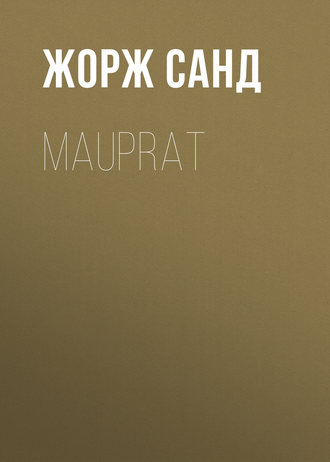 полная версия
полная версияMauprat
“Before I knew the poets,” he said towards the end of his life, “I was a man lacking in one of the senses. I could see plainly that this sense was necessary, since there were so many things calling for its operation. In my solitary walks at night I used to feel a strange uneasiness; I used to wonder why I could not sleep; why I should find such pleasure in gazing upon the stars that I could not tear myself from their presence; why my heart should suddenly beat with joy on seeing certain colours, or grow sad even to tears on hearing certain sounds. At times I was so alarmed on comparing my continual agitation with the indifference of other men of my class that I even began to imagine that I was mad. But I soon consoled myself with the reflection that such madness was sweet, and I would rather have ceased to exist than be cured of it. Now that I know these things have been thought beautiful in all times and by all intelligent beings, I understand what they are, and how they are useful to man. I find joy in the thought that there is not a flower, not a colour, not a breath of air, which has not absorbed the minds and stirred the hearts of other men till it has received a name sacred among all peoples. Since I have learnt that it is allowed to man, without degrading his reason, to people the universe and interpret it by his dreams, I live wholly in the contemplation of the universe; and when the sight of the misery and crime in the world bruises my heart and shakes my reason, I fall back upon my dreams. I say to myself that, since all men are united in their love of the works of God, some day they will also be united in their love of one another. I imagine that education grows more and more perfect from father to son. It may be that I am the first untutored man who has divined truths of which no glimpse was given him from without. It may be, too, that many others before myself have been perplexed by the workings of their hearts and brains and have died without ever finding an answer to the riddle.” “Ah, we poor folk,” added Patience, “we are never forbidden excess in labour, or in wine, or in any of the debauches which may destroy our minds. There are some people who pay dearly for the work of our arms, so that the poor, in their eagerness to satisfy the wants of their families, may work beyond their strength. There are taverns and other places more dangerous still, from which, so it is said, the government draws a good profit; and there are priests, too, who get up in their pulpits to tell us what we owe to the lord of our village, but never what the lord owes to us. Nowhere is there a school where they teach us our real rights; where they show us how to distinguish our true and decent wants from the shameful and fatal ones; where, in short, they tell us what we can and ought to think about when we have borne the burden and heat of the day for the profit of others, and are sitting in the evening at the door of our huts, gazing on the red stars as they come out on the horizon.”
Thus would Patience reason; and, believe me, in translating his words into our conventional language, I am robbing them of all their grace, all their fire, and all their vigour. But who could repeat the exact words of Patience? His was a language used by none but himself; it was a mixture of the limited, though forcible, vocabulary of the peasants and of the boldest metaphors of the poets, whose poetic turns he would often make bolder still. To this mixed idiom his sympathetic mind gave order and logic. An incredible wealth of thought made up for the brevity of the phrases that clothed it. You should have seen how desperately his will and convictions strove to overcome the impotence of his language; any other than he would have failed to come out of the struggle with honour. And I assure you that any one capable of something more serious than laughing at his solecisms and audacities of phrase, would have found in this man material for the most important studies on the development of the human mind, and an incentive to the most tender admiration for primitive moral beauty.
When, subsequently, I came to understand Patience thoroughly, I found a bond of sympathy with him in my own exceptional destiny. Like him, I had been without education; like him, I had sought outside myself for an explanation of my being – just as one seeks the answer to a riddle. Thanks to the accidents of my birth and fortune, I had arrived at complete development, while Patience, to the hour of his death, remained groping in the darkness of an ignorance from which he neither would nor could emerge. To me, however, this was only an additional reason for recognising the superiority of that powerful nature which held its course more boldly by the feeble light of instinct, than I myself by all the brilliant lights of knowledge; and which, moreover, had not had a single evil inclination to subdue, while I had had all that a man may have.
At the time, however, at which I must take up my story, Patience was still, in my eyes, merely a grotesque character, an object of amusement for Edmee, and of kindly compassion for the Abbe Aubert. When they spoke to me about him in a serious tone, I no longer understood them, and I imagined they took this subject as a sort of text whereon to build a parable proving to me the advantages of education, the necessity of devoting myself to study early in life, and the futility of regrets in after years.
Yet this did not prevent me from prowling about the copses about his new abode, for I had seen Edmee crossing the park in that direction, and I hoped that if I took her by surprise as she was returning, I should get a conversation with her. But she was always accompanied by the abbe, and sometimes even by her father, and if she remained alone with the old peasant, he would escort her to the chateau afterwards. Frequently I have concealed myself in the foliage of a giant yew-tree, which spread out its monstrous shoots and drooping branches to within a few yards of the cottage, and have seen Edmee sitting at the door with a book in her hand while Patience was listening with his arms folded and his head sunk on his breast, as though he were overwhelmed by the effort of attention. At that time I imagined that Edmee was trying to teach him to read, and thought her mad to persist in attempting an impossible education. But how beautiful she seemed in the light of the setting sun, beneath the yellowing vine leaves that overhung the cottage door! I used to gaze on her and tell myself that she belonged to me, and vow never to yield to any force or persuasion which should endeavour to make me renounce my claim.
For some days my agony of mind had been intense. My only method of escaping from it had been to drink heavily at supper, so that I might be almost stupefied at the hour, for me so painful and so galling, when she would leave the drawing-room after kissing her father, giving her hand to M. de la Marche, and saying as she passed by me, “Good-night, Bernard,” in a tone which seemed to say, “To-day has ended like yesterday, and to-morrow will end like to-day.”
In vain would I go and sit in the arm-chair nearest her door, so that she could not pass without at least her dress brushing against me; this was all I ever got from her. I would not put out my hand to beg her own, for she might have given it with an air of unconcern, and I verily believe I should have crushed it in my anger.
Thanks to my large libations at supper, I generally succeeded in besotting myself, silently and sadly. I then used to sink into my favourite arm-chair and remain there, sullen and drowsy, until the fumes of the wine had passed away, and I could go and air my wild dreams and sinister plans in the park.
None seemed to notice this gross habit of mine. They showed me such kindness and indulgence in the family that they seemed afraid to express disapproval, however much I deserved it. Nevertheless, they were well aware of my shameful passion for wine, and the abbe informed Edmee of it. One evening at supper she looked at me fixedly several times and with a strange expression. I stared at her in return, hoping that she would say something to provoke me, but we got no further than an exchange of malevolent glances. On leaving the table she whispered to me very quickly, and in an imperious tone:
“Break yourself of this drinking, and pay attention to what the abbe has to say to you.”
This order and tone of authority, so far from filling me with hope, seemed to me so revolting that all my timidity vanished in a moment. I waited for the hour when she usually went up to her room and, going out a little before her, took up my position on the stairs.
“Do you think,” I said to her when she appeared, “that I am the dupe of your lies, and that I have not seen perfectly, during the month I have been here, without your speaking a word to me, that you are merely fooling me, as if I were a booby? You lied to me and now you despise me because I was honest enough to believe your word.”
“Bernard,” she said, in a cold tone, “this is neither the time nor the place for an explanation.”
“Oh, I know well enough,” I replied, “that, according to you, it will never be the time or the place. But I shall manage to find both, do not fear. You said that you loved me. You threw your arms about my neck and said, as you kissed me – yes, here, I can still feel your lips on my cheeks: ‘Save me, and I swear on the gospel, on my honour, by the memory of my mother and your own, that I will be yours.’ I can see through it; you said that because you were afraid that I should use my strength, and now you avoid me because you are afraid I shall claim my right. But you will gain nothing by it. I swear that you shall not trifle with me long.”
“I will never be yours,” she replied, with a coldness which was becoming more and more icy, “if you do not make some change in your language, and manners, and feelings. In your present state I certainly do not fear you. When you appeared to me good and generous, I might have yielded to you, half from fear and half from affection. But from the moment I cease to care for you, I also cease to be afraid of you. Improve your manners, improve your mind, and we will see.”
“Very good,” I said, “that is a promise I can understand. I will act on it, and if I cannot be happy, I will have my revenge.”
“Take your revenge as much as you please,” she said. “That will only make me despise you.”
So saying, she drew from her bosom a piece of paper, and burnt it in the flame of her candle.
“What are you doing?” I exclaimed.
“I am burning a letter I had written to you,” she answered. “I wanted to make you listen to reason, but it is quite useless; one cannot reason with brutes.”
“Give me that letter at once,” I cried, rushing at her to seize the burning paper.
But she withdrew it quickly and, fearlessly extinguishing it in her hand, threw the candle at my feet and fled in the darkness. I ran after her, but in vain. She was in her room before I could get there, and had slammed the door and drawn the bolts. I could hear the voice of Mademoiselle Leblanc asking her young mistress the cause of her fright.
“It is nothing,” replied Edmee’s trembling voice, “nothing but a joke.”
I went into the garden, and strode up and down the walks at a furious rate. My anger gave place to the most profound melancholy. Edmee, proud and daring, seemed to me more desirable than ever. It is the nature of all desire to be excited and nourished by opposition. I felt that I had offended her, and that she did not love me, that perhaps she would never love me; and, without abandoning my criminal resolution to make her mine by force, I gave way to grief at the thought of her hatred of me. I went and leaned upon a gloomy old wall which happened to be near, and, burying my face in my hands, I broke into heart-rending sobs. My sturdy breast heaved convulsively, but tears would not bring the relief I longed for. I could have roared in my anguish, and I had to bite my handkerchief to prevent myself from yielding to the temptation. The weird noise of my stifled sobs attracted the attention of some one who was praying in the little chapel on the other side of the wall which I had chanced to lean against. A Gothic window, with its stone mullions surmounted by a trefoil, was exactly on a level with my head.
“Who is there?” asked some one, and I could distinguish a pale face in the slanting rays of the moon which was just rising.
It was Edmee. On recognising her I was about to move away, but she passed her beautiful arm between the mullions, and held me back by the collar of my jacket, saying:
“Why are you crying, Bernard?”
I yielded to her gentle violence, half ashamed at having betrayed my weakness, and half enchanted at finding that Edmee was not unmoved by it.
“What are you grieved at?” she continued. “What can draw such bitter tears from you?”
“You despise me; you hate me; and you ask why I am in pain, why I am angry!”
“It is anger, then, that makes you weep?” she said, drawing back her arm.
“Yes; anger or something else,” I replied.
“But what else?” she asked.
“I can’t say; probably grief, as you suggest. The truth is my life here is unbearable; my heart is breaking. I must leave you, Edmee, and go and live in the middle of the woods. I cannot stay here any longer.”
“Why is life unbearable? Explain yourself, Bernard. Now is our opportunity for an explanation.”
“Yes, with a wall between us. I can understand that you are not afraid of me now.”
“And yet it seems to me that I am only showing an interest in you; and was I not as affectionate an hour ago when there was no wall between us?”
“I begin to see why you are fearless, Edmee; you always find some means of avoiding people, or of winning them over with pretty words. Ah, they were right when they told me that all women are false, and that I must love none of them.”
“And who told you that? Your Uncle John, I suppose, or your Uncle Walter; or was it your grandfather, Tristan?”
“You can jeer – jeer at me as much as you like. It is not my fault that I was brought up by them. There were times, however, when they spoke the truth.”
“Bernard, would you like me to tell you why they thought women false?”
“Yes, tell me.”
“Because they were brutes and tyrants to creatures weaker than themselves. Whenever one makes one’s self feared one runs the risk of being deceived. In your childhood, when John used to beat you, did you never try to escape his brutal punishment by disguising your little faults?”
“I did; that was my only resource.”
“You can understand, then, that deception is, if not the right, at least the resource of the oppressed.”
“I understand that I love you, and in that at any rate there can be no excuse for your deceiving me.”
“And who says that I have deceived you?”
“But you have; you said you loved me; you did not love me.”
“I loved you, because at a time when you were wavering between detestable principles and the impulses of a generous heart I saw that you were inclining towards justice and honesty. And I love you now, because I see that you are triumphing over these vile principles, and that your evil inspirations are followed by tears of honest regret. This I say before God, with my hand on my heart, at a time when I can see your real self. There are other times when you appear to me so below yourself that I no longer recognise you and I think I no longer love you. It rests with you, Bernard, to free me from all doubts, either about you or myself.”
“And what must I do?”
“You must amend your bad habits, open your ears to good counsel and your heart to the precepts of morality. You are a savage, Bernard; and, believe me, it is neither your awkwardness in making a bow, nor your inability to turn a compliment that shocks me. On the contrary, this roughness of manner would be a very great charm in my eyes, if only there were some great ideas and noble feelings beneath it. But your ideas and your feelings are like your manners, that is what I cannot endure. I know it is not your fault, and if I only saw you resolute to improve I should love you as much for your defects as for your qualities. Compassion brings affection in its train. But I do not love evil, I never loved it; and, if you cultivate it in yourself instead of uprooting it, I can never love you. Do you understand me?”
“No.”
“What, no!”
“No, I say. I am not aware that there is any evil in me. If you are not displeased at the lack of grace in my legs, or the lack of whiteness in my hands, or the lack of elegance in my words, I fail to see what you find to hate in me. From my childhood I have had to listen to evil precepts, but I have not accepted them. I have never considered it permissible to do a bad deed; or, at least, I have never found it pleasurable. If I have done wrong, it is because I have been forced to do it. I have always detested my uncles and their ways. I do not like to see others suffer; I do not rob a fellow-creature; I despise money, of which they made a god at Roche-Mauprat; I know how to keep sober, and, though I am fond of wine, I would drink water all my life if, like my uncles, I had to shed blood to get a good supper. Yet I fought for them; yet I drank with them. How could I do otherwise? But now, when I am my own master, what harm am I doing? Does your abbe, who is always prating of virtue, take me for a murderer or a thief? Come, Edmee, confess now; you know well enough that I am an honest man; you do not really think me wicked; but I am displeasing to you because I am not clever, and you like M. de la Marche because he has a knack of making unmeaning speeches which I should blush to utter.”
“And if, to be pleasing to me,” she said with a smile, after listening most attentively, and without withdrawing her hand which I had taken through the bars, “if, in order to be preferred to M. de la Marche, it were necessary to acquire more wit, as you say, would you not try?”
“I don’t know,” I replied, after hesitating a moment; “perhaps I should be fool enough; for the power you have over me is more than I can understand; but it would be a sorry piece of cowardice and a great folly.”
“Why, Bernard?”
“Because a woman who could love a man, not for his honest heart, but for his pretty wit, would be hardly worth the pains I should have to take; at least so it seems to me.”
She remained silent in her turn, and then said to me as she pressed my hand:
“You have much more sense and wit than one might think. And since you force me to be quite frank with you, I will own that, as you now are and even should you never change, I have an esteem and an affection for you which will last as long as my life. Rest assured of that, Bernard, whatever I may say in a moment of anger. You know I have a quick temper – that runs in the family. The blood of the Mauprats will never flow as smoothly as other people’s. Have a care for my pride, then, you know so well what pride is, and do not ever presume upon rights you have acquired. Affection cannot be commanded; it must be implored or inspired. Act so that I may always love you; never tell me that I am forced to love you.”
“That is reasonable enough,” I answered; “but why do you sometimes speak to me as if I were forced to obey you? Why, for instance, this evening did you forbid me to drink and order me to study?”
“Because if one cannot command affection which does not exist, one can at least command affection which does exist; and it is because I am sure yours exists that I commanded it.”
“Good!” I cried, in a transport of joy; “I have a right then to order yours also, since you have told me that it certainly exists… Edmee, I order you to kiss me.”
“Let go, Bernard!” she cried; “you are breaking my arm. Look, you have scraped it against the bars.”
“Why have you intrenched yourself against me?” I said, putting my lips to the little scratch I had made on her arm. “Ah, woe is me! Confound the bars! Edmee, if you would only bend your head down I should be able to kiss you.. kiss you as my sister. Edmee, what are you afraid of?”
“My good Bernard,” she replied, “in the world in which I live one does not kiss even a sister, and nowhere does one kiss in secret. I will kiss you every day before my father, if you like; but never here.”
“You will never kiss me!” I cried, relapsing into my usual passion. “What of your promise? What of my rights?”
“If we marry,” she said, in an embarrassed tone, “when you have received the education I implore you to receive,.”
“Death of my life! Is this a jest? Is there any question of marriage between us? None at all. I don’t want your fortune, as I have told you.”
“My fortune and yours are one,” she replied. “Bernard, between near relations as we are, mine and thine are words without meaning. I should never suspect you of being mercenary. I know that you love me, that you will work to give me proof of this, and that a day will come when your love will no longer make me fear, because I shall be able to accept it in the face of heaven and earth.”
“If that is your idea,” I replied, completely drawn away from my wild passion by the new turn she was giving to my thoughts, “my position is very different; but, to tell you the truth, I must reflect on this; I had not realized that this was your meaning.”
“And how should I have meant otherwise?” she answered. “Is not a woman dishonoured by giving herself to a man who is not her husband? I do not wish to dishonour myself; and, since you love me, you would not wish it either. You would not do me an irreparable wrong. If such were your intention you would be my deadliest enemy.”
“Stay, Edmee, stay!” I answered. “I can tell you nothing about my intentions in regard to you, for I have never had any very definite. I have felt nothing but wild desires, nor have I ever thought of you without going mad. You wish me to marry you? But why – why?”
“Because a girl who respects herself cannot be any man’s except with the thought, with the intention, with the certainty of being his forever. Do you not know that?”
“There are so many things I do not know or have never thought of.”
“Education will teach you, Bernard, what you ought to think about the things which must concern you – about your position, your duties, your feelings. At present you see but dimly into your heart and conscience. And I, who am accustomed to question myself on all subjects and to discipline my life, how can I take for master a man governed by instinct and guided by chance?”
“For master! For husband! Yes, I understand that you cannot surrender your whole life to an animal such as myself.. but that is what I have never asked of you. No, I tremble to think of it.”
“And yet, Bernard, you must think of it. Think of it frequently, and when you have done so you will realize the necessity of following my advice, and of bringing your mind into harmony with the new life upon which you have entered since quitting Roche-Mauprat. When you have perceived this necessity you must tell me, and then we will make several necessary resolutions.”
She withdrew her hand from mine quickly, and I fancy she bade me good-night; but this I did not hear. I stood buried in my thoughts, and when I raised my head to speak to her she was no longer there. I went into the chapel, but she had returned to her room by an upper gallery which communicated with her apartments.
I went back into the garden, walked far into the park, and remained there all night. This conversation with Edmee had opened a new world to me. Hitherto I had not ceased to be the Roche-Mauprat man, nor had I ever contemplated that it was possible or desirable to cease to be so. Except for some habits which had changed with circumstances, I had never moved out of the narrow circle of my old thoughts. I felt annoyed that these new surroundings of mine should have any real power over me, and I secretly braced my will so that I should not be humbled. Such was my perseverance and strength of character that I believed nothing would ever have driven me from my intrenchment of obstinacy, had not Edmee’s influence been brought to bear upon me. The vulgar comforts of life, the satisfactions of luxury, had no attraction for me beyond their novelty. Bodily repose was a burden to me, and the calm that reigned in this house, so full of order and silence, would have been unbearable, had not Edmee’s presence and the tumult of my own desires communicated to it some of my disorder, and peopled it with some of my visions. Never for a single moment had I desired to become the head of this house, the possessor of this property; and it was with genuine pleasure that I had just heard Edmee do justice to my disinterestedness. The thought of coupling two ends so entirely distinct as my passion and my interests was still more repugnant to me. I roamed about the park a prey to a thousand doubts, and then wandered into the open country unconsciously. It was a glorious night. The full moon was pouring down floods of soft light upon the ploughed lands, all parched by the heat of the sun. Thirsty plants were straightening their bowed stems – each leaf seemed to be drinking in through all its pores all the dewy freshness of the night. I, too, began to feel a soothing influence at work. My heart was still beating violently, but regularly. I was filled with a vague hope; the image of Edmee floated before me on the paths through the meadows, and no longer stirred the wild agonies and frenzied desires which had been devouring me since the night I first beheld her.









